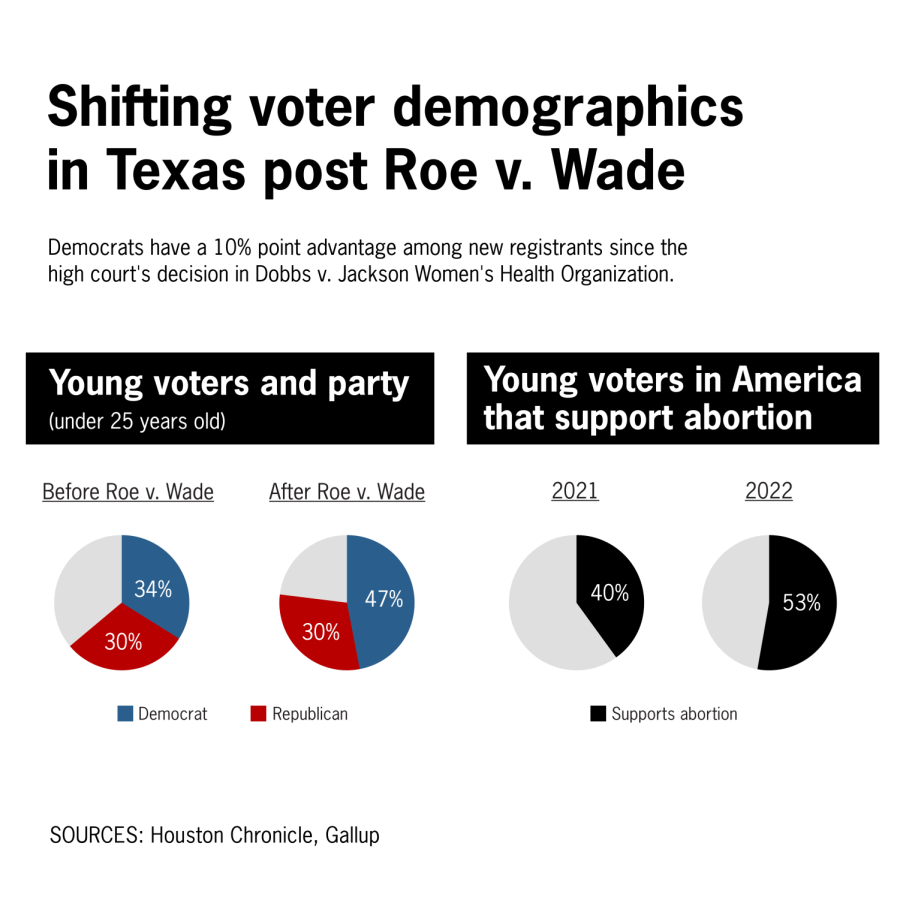After the repeal of Roe v. Wade, students seek to expand voter registration counts
October 3, 2022
According to data from a study conducted by polling firm TargetSmart, more than 300,000 people ages 18-25 have registered to vote in Texas since the overturn of Roe v. Wade.
Marina Garfield, a Plan II and psychology freshman, is a volunteer deputy registrar who gets Texans registered to vote. Garfield said she believes it’s important for college students to be involved in politics because decisions made now will affect their future.
“Right now, we are in this era of such extremism, that we really have this unique opportunity to take a step back … and ask what do we want for the state because things aren’t as red and blue anymore,” Garfield said. “Texas is becoming a purple state.”
Historically, younger people have been less likely to show up at the polls compared to older voters. In the 2016 presidential election, less than 50% of people aged 18 to 29 voted, according to The New York Times.
Sophomore English major Maggie Disanza, Central Texas campus organizer for Texas Rising, an organization which registers students to vote and encourages civic engagement, said she thinks young people are starting to realize the power they have at the polls to create the changes they want.
“I think just given how many monumental political events that have taken place within the past couple of years, young people are getting more and more excited and involved in politics, just because there’s so much at stake,” Disanza said.
Garfield said she has seen young people more eager to vote, particularly women, since the overturn of Roe v. Wade. The Supreme Court’s decision in June repealed federal protection of abortion rights, leaving up to each individual state to determine its abortion law. In Texas, abortion is illegal.
“I think that (the overturn of Roe v. Wade) really was a very prime example of how something that we just thought of as a right (could) be taken away at any minute and how our vote matters,” Garfield said.
Disanza said that young people have always shown an interest in politics but sometimes don’t have the means to register and vote.
“I mean, it is definitely a common argument that we’ve seen … from people who want to disenfranchise the youth vote — that young people don’t care,” Disanza said. “But that is just simply not true. In fact, Texas youth voters lead the nation in youth voter turnout, and they did that in the 2020 election and every year, we have seen more and more young people show up.”
Kerry O’Malley Gleim, senior communication and leadership major, former co-director of Hook the Vote and current student government executive, said the lack of accessibility is a barrier for younger people to vote, and may explain low turnouts of younger people at the polls in the past.
“I know personally for me, I work two jobs,” O’Malley Gleim said. “I’m taking a full load of classes and as civically engaged as I am, I’m stressed about finding time to vote because it is such a labor-intensive thing you have to do.”
Texas has some of the strictest voting ID laws in the country, and UT Student IDs do not count as a valid form of photo identification, despite being government issued, O’Malley Gleim said.
In order to vote, students will have to show another form of ID, such as a driver’s license or passport.
There are currently two polling places on campus; students can vote at the Flawn Academic Center or the LBJ Library during early voting from Oct. 24 to Nov. 4, or on election day Nov 8 for the upcoming Texas midterm elections. With a shortage of poll workers, lines at both these centers are expected to be long, O’Malley Gleim said.
“Sometimes students and faculty and staff can’t take time off of work or school to go and vote,” Disanza said. “If they aren’t given the actual adequate support to be able to go and do that, whether it’s paid time off, or knowing where ballot boxes are, then it’s going to be really hard for people to vote”.
In Texas, election day is not recognized as a holiday, meaning students are not guaranteed off school and people are not guaranteed off work.
However, despite the challenges that come with voting, Disanza said she urges more young people to get registered and engage in politics.
“Not only registering to vote, but actually voting allows you and everyone else in our community to have a direct say in what’s going on not just at the state and national level, but also what’s happening in city and campus politics,” Disanza said. “Know that there are politicians in Texas who do not want young people to vote because they are afraid of the changes that we will make in Texas and we are choosing to really celebrate and embrace civic participation as an act of defiance to those in power who seek to silence our voices”.



